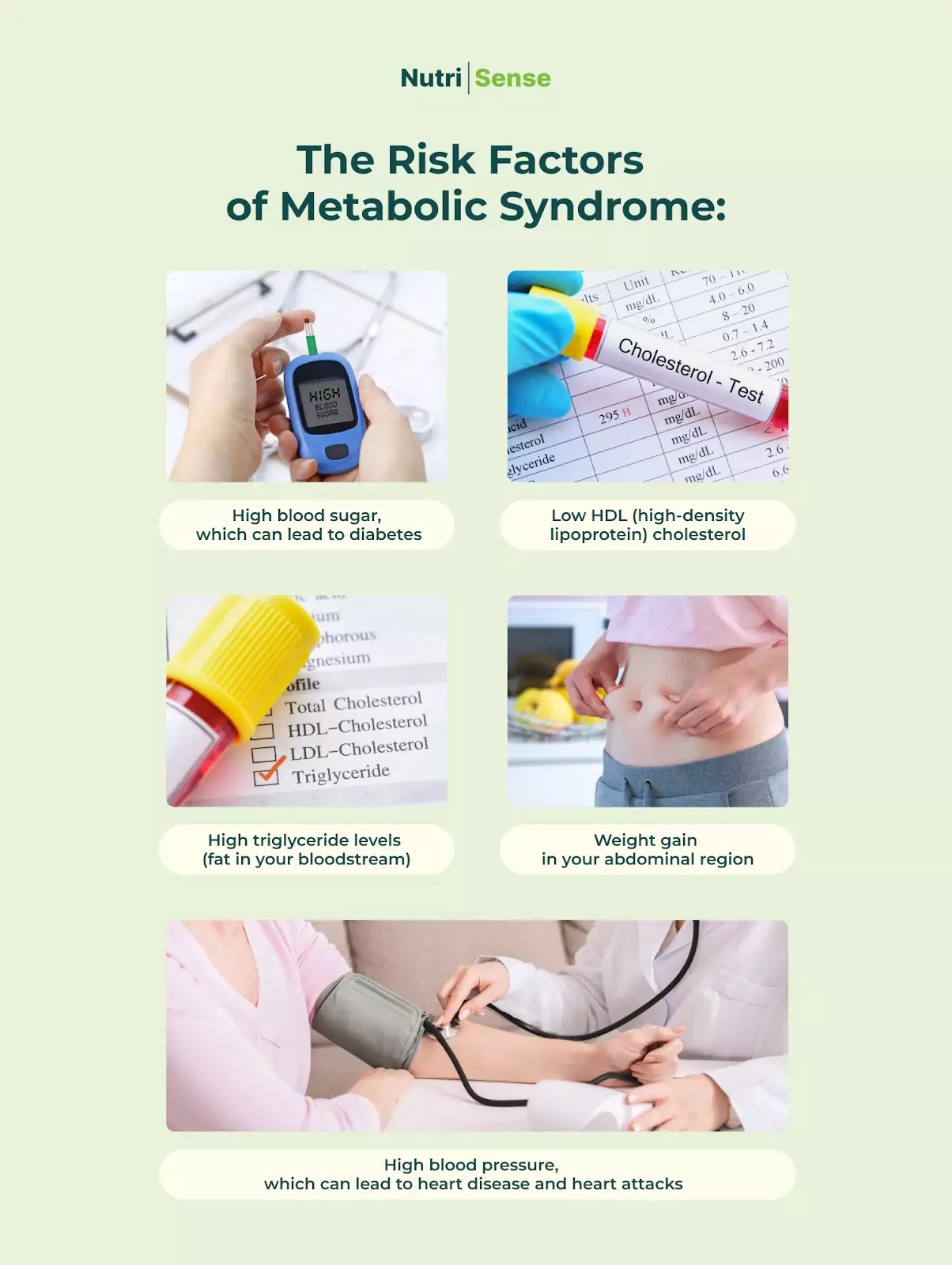How Does Menopause Affect Your Metabolic Health?

Key Takeaways
Menopause brings hormonal shifts that directly affect metabolic health. Declining estrogen levels can slow your metabolism, alter how the body stores fat, and impact glucose regulation, which may lead to weight gain and increased long-term health risks.
Highlights:
- Hormonal changes during menopause can reduce insulin sensitivity and increase abdominal fat, raising the risk for metabolic syndrome.
- Explore how diet, exercise, and stress management can help you support your metabolic health through this transition.
- The Nutrisense program offers 1-on-1 guidance from a registered dietitian, with video calls that may be covered by your insurance.
From irregular periods and hot flashes to night sweats and sudden weight gain, menopause can bring a host of scary symptoms with it. But there's nothing to be scared of about this natural process! Menopause is a natural process that signals the end of your menstrual cycles, and it's something all women experience as they age.
What is menopause?
To explain it a little better: menopause is a time in a woman's life when her menstrual periods stop, and she can no longer get pregnant. Ups and downs are typical during a menstrual cycle, so skipping one or even a few months doesn't always mean you're going through menopause. Skipping an entire year, however, is one of the most common symptoms of menopause.
Age and timing
Menopause typically occurs between 45 and 55 but can occur earlier or later, depending on various factors. If it happens earlier, you may be experiencing premature menopause, which can occur due to medical conditions and genetics. The average age at which women experience menopause symptoms in the United States is 51 years old, but some people may experience early menopause.
Everyone's experience is unique, but some common symptoms can be clues to help you figure out whether what you're experiencing is indeed menopause. For example, many women experience changes in their metabolism during natural menopause, leading to problems such as weight gain and difficulty losing weight.
Fortunately, healthy lifestyle changes and hormone therapies (like hormone replacement therapy) can help you manage your metabolic health during your menopausal journey.
What symptoms are common in menopause?

Menopause can be a tumultuous experience for some women. But while it can be challenging for some, it's also a natural experience and something of a milestone in a woman's life. After all, it's often a sign of the end of your fertility.
When you go through menopause, your ovaries produce less estrogen and progesterone hormones.
When Your Trusted Routine Betrays You
You finish another 45-minute spin class, but the stubborn weight around your middle won't budge. The diet and exercise plan that worked for you just a few years ago now feels like a frustrating dead end. You’re left feeling tired, anxious, and the sudden hot flashes only confirm that your body is playing by a new set of rules you don't understand.
How Long Do Menopause Symptoms Last?
For some women, the symptoms of menopause last for the entire duration of this experience—which can vary from person to person. They usually last for an average of four and a half years but can go on for up to 11! Postmenopausal women may experience some symptoms that linger even after they have gone through the menopausal transition.
Everyone experiences menopause differently, but some of the symptoms of menopause that you might experience include:
- Hot flashes
- Night sweats
- Difficulty managing your weight
- Increased levels of belly fat
- Joint aches and pains
- Loss of libido
- Increased anxiety
- Brain fog
- Irregular menstruation
- Chills
- Sleep problems
- Weight gain due to slowing metabolism
- Thinning hair
- Dry skin
- Vaginal dryness
- Urinary incontinence
An official diagnosis for menopause is typically made after you have gone around 12 months without a menstrual cycle. Many women experience changes in their menstrual cycle and other symptoms for a few years leading up to menopause. It's known as a menopausal transition or perimenopause.
What Is Metabolic Health and Why Is It Important?

If you're like most people, you probably don't give much thought to your metabolic health. But did you know that it's one of the most critical aspects of your overall health?
Metabolic health refers to your body's ability to convert food into energy. When it's functioning optimally, it allows you to maintain a healthy weight, strong bones, and good cardiovascular health. It's all about maintaining a healthy balance of chemicals and enzymes in your body. When this balance is disrupted, it can lead to a higher risk of developing medical conditions.
So, in a nutshell, metabolic health is a term used to describe how well your body functions metabolically. It's not just about weight or body composition but also about how all the different metabolic processes work together. Improving your metabolic health can help you feel better, look better, and reduce your risk of obesity, cardiovascular disease, and diabetes. And, it can help during menopause too!
How Is Metabolic Health Related to Menopause?

As you transition into menopause, your body will go through several changes. Metabolic health is one area that can be affected, and it's essential to understand how these changes can impact your overall wellbeing.
Metabolic syndrome link
It's imperative to focus on metabolic health as there are links between menopause and metabolic syndrome. Assessing your metabolic health with your healthcare provider during perimenopause may help prevent metabolic syndrome when you go through menopause. And balancing your blood sugar levels and closely monitoring your diet may help you prevent weight gain during this time too.
Body fat changes
Remember that menopause leads to a decrease in estrogen levels and an increase in circulating androgens, resulting in changes to body fat distribution. All of this can lead to the development of fat in your abdomen.
Potential health risks
It's essential to maintain metabolic health during perimenopause and menopause to avoid metabolic syndrome, which can increase the risk of various conditions, including breast cancer, kidney disease, bone loss, high blood sugar, mental health conditions, and osteoporosis.

How Can You Stay Healthy During Menopause?

Menopause can bring about some unwelcome changes, including hot flashes, insomnia, changes in hormone levels, and mood swings. As you approach menopause, it's more important than ever to focus on your health. It means making sure you're getting enough exercise and eating a balanced diet that's best for your specific needs.
It also means paying attention to any symptoms you may be experiencing and taking steps to manage them. You can work on your diet and lifestyle, making changes to improve your chances of going through menopause with fewer symptoms and a lower impact on your metabolic health.
If you begin experiencing the symptoms of menopause or you're approaching 'midlife,' you may want to consult (regularly!) with a healthcare provider that specializes in women's health. It's vital to get medical advice as you begin regulating your overall health during the time leading up to your last period.
Consider hormone therapy
Your doctor may recommend supplements, hormone replacement therapy, birth control, lubricants (for vaginal dryness), or other treatment options to help you during this transitional period. Here are some tips to help you stay healthy during menopause:
Maintain a Healthy Diet
While there are no one-size-fits-all remedies for managing the symptoms of menopause, good nutrition is undoubtedly an essential part of the equation. By eating a healthy diet that includes plenty of fruits, vegetables, lean protein, and healthy fats, you can ease your symptoms and maintain optimal health during menopause.
- Eating a diet high in protein, fiber, and healthy fats with fewer carbohydrates can help promote healthy weight loss. It can also improve insulin sensitivity in some, leading to better glucose control and an overall improvement in how your body responds to menopause.
- Add a moderate amount of healthy fats like nuts, olive oil, avocado, or oily fish to your diet. It can help your body keep your blood sugar levels more stable.
- Opt for whole grains over processed grains. Eating fewer refined carbohydrates can help lower your blood glucose response.
- Ensure your diet includes essential nutrients, vitamins, and minerals, including calcium and vitamin D.
Stick to an Exercise Routine

Exercise has many benefits, including helping to reduce the symptoms of menopause, improving your mood, and preventing weight gain. Without regular exercise, you can lose muscle mass, leading to a decline in metabolism and inevitably to weight gain, whether you're going through menopause or not!
Any type of physical activity is good for you, so find something you enjoy and stick with it. Physical activity can also prevent weight gain and help with mood changes during menopause.
Here are some exercises to try during (and before) menopause:
- Stretching can help you maintain flexibility during menopause.
- Aerobic activity is the perfect way to keep weight off or lose weight. Aerobic exercises include walking, running, biking, rowing, and swimming.
- Strength training will strengthen your muscles and help your metabolism burn calories more efficiently.
- Focus on pushes, pulls, squats, or hinges, and carries. Add a small increase in weight, reps, or sets each week, then deload every 4 to 6 weeks.
Reduce your Alcohol Consumption
Menopause is a natural occurrence, but it's not always an easy journey. For many women, the symptoms can feel miserable, and it can take a few years to feel like yourself again.
So, it might seem like the right time to give yourself a pass on that extra glass of wine. Still, excess alcohol may worsen menopausal symptoms. You can enjoy a drink or two during menopause, but the key to maintaining your health is to indulge in moderation.
If you're experiencing changes in blood glucose trends (it's a good idea to check these as often as possible), you may want to consider seeking medical advice as alcohol can cause dips in blood sugar levels.
Use a Continuous Glucose Monitor

Using a continuous glucose monitor (CGM) can be a real eye-opener to the changes that are going on in your body. Keeping your blood sugar levels stable will help prevent spikes and dips, which will cause long-term health issues. Blood sugar imbalances may also trigger symptoms like hot flashes, night sweats, and brain fog. So, it's best to stay on top of them even if you're not already perimenopausal.
Find the right Nutrisense programto turn insight into progress.
Menopause and metabolic health FAQ
Q1. Do I need a prescription for a sensor with Nutrisense, and how long does each one last?
A1. With Nutrisense, members use over-the-counter glucose biosensors that measure glucose in interstitial fluid. Each sensor typically lasts up to 15 days once activated, and members receive two sensors per month. You can view 24/7 trends in the app and pair data with meal and activity logs to spot patterns.
Source: What is a CGM
Q2. Can I wear a sensor while bathing, swimming, or using a sauna?
A2. The sensor is waterproof for everyday bathing and swimming, and can be protected with adhesive covers. To support performance, avoid exposing it to extreme heat or cold, such as saunas or ice baths. If you swim frequently, optional patches may help keep it secure on the skin.
Source: Best CGM patches
Q3. How can I track how menopause symptoms relate to meals, sleep, or stress in the Nutrisense app?
A3. Use the app to log meals, workouts, sleep, and notes, then review your 24/7 glucose trends to spot patterns around hot flashes, night sweats, mood, or energy. Many members run small experiments, such as meal timing or walk duration, and compare responses. A registered dietitian can help interpret patterns and plan next steps.
Source: Nutrisense app how to
Q4. Can I use Nutrisense if I am on hormone therapy or other menopause medications?
A4. Yes. Nutrisense does not prescribe medications, and many members use the program while taking prescribed therapies. The biosensor shows your glucose trends in interstitial fluid, and your coach can help you adjust food, movement, and routines based on your goals. Always discuss medication questions with your healthcare provider.
Source: Nutritionist video calls
Q5. How soon can I start, and can I pause my account if symptoms flare or I travel?
A5. After signing up and completing the registration, approval usually takes 1 to 2 business days. Orders ship to US addresses, and subscriptions offer the flexibility to pause in 30-day blocks, based on your plan length. You can make changes at any time by contacting our support team. See plan options for details.
Source: CGM plans
Go Beyond Glucose Data with Nutrisense
Your glucose can significantly impact how your body feels and functions. That’s why stable levels are an important factor in supporting overall wellbeing. But viewing glucose isn't enough. Nutrisense, you’ll be able to learn how to use your body's data to make informed lifestyle choices that support healthy living.
One-to-one coaching
Sign up to access insurance-covered video calls to work with a glucose expert: a personal registered dietitian or certified nutritionist who will help tailor your lifestyle and diet to your goals.
Monitor and measure what matters
With the Nutrisense CGM Program, you can monitor your glucose with health tech like glucose biosensors and continuous glucose monitor (CGM)s, and analyze the trends over time with the Nutrisense App. This will help you make the most informed choices about the foods you consume and their impact on your health.
Find your best fit
Ready to take the first step? Start with our quiz to find the right Nutrisense program to help you take control.

Cheri is a registered dietitian and Health Co-Ordinator Product Development at Nutrisense, with a Master's degree from the University of Utah in Integrative Physiology and Nutrition. She has a strong interest in functional and integrative nutrition and emphasizes the importance of exploring and using your own body (symptoms, energy, mood, labs, CGM data) to find what your personal optimal is.




